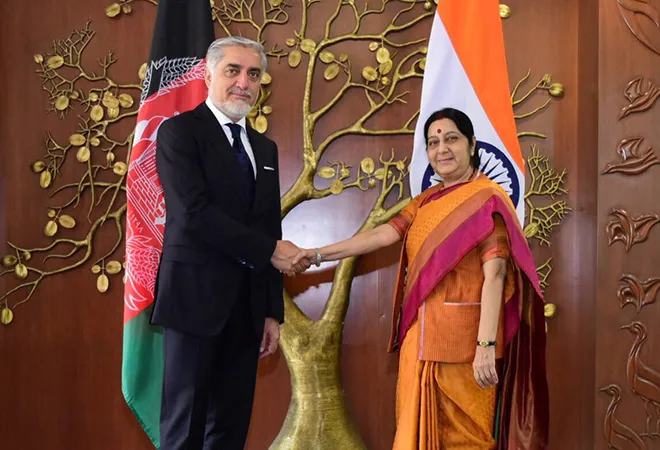Chief Executive of Afghanistan Abdullah Abdullah was supposed to inaugurate the three-day India-Afghanistan trade and investment show in New Delhi this week, but rocket attacks on Kabul airport earlier this week did not allow him to be a part of the ceremony. Instead, the fair was inaugurated by Finance Minister Arun Jaitley and chargé d’affaires of the US embassy in Delhi, MaryKay Carlson. Despite this, Abdullah’s visit to India this week saw him underscoring the growing potency of India-Afghanistan ties in his meetings with Prime Minister Narendra Modi and External Affairs Minister Sushma Swaraj.
While Abdullah conveyed Afghanistan’s appreciation for India’s continuing support for infrastructure development and capacity building in Afghanistan, Modi reaffirmed New Delhi’s “commitment to extending full support to Afghanistan’s efforts for building a peaceful, united, prosperous, inclusive and democratic Afghanistan.” The two nations signed a MoU (Memorandum of Understanding) for Technical Cooperation on Police Training and Development. India is focusing on training of Afghan security personnel at a time when the security situation in the country is parlous.
Not surprisingly, Abdullah discussed the issue of cross-border terrorism with Swaraj, which remains an area of common concern to Kabul and New Delhi. India and Afghanistan had come together at the UN recently to target Pakistan as the epicentre of regional and global terrorism. Swaraj was categorical in her UN speech, saying “when Pakistan PM accused India of state-sponsored terrorism, those listening had only one observation: ‘Look, who’s talking!’” She went on to argue that “a country that has been the world’s greatest exporter of havoc, death and inhumanity became a champion of hypocrisy by preaching about humanity from this podium .”
This got Afghanistan’s support. “The scourge of terrorism affecting Afghanistan is (a) product of (the) long-standing policy by a neighbouring State to keep Afghanistan unstable,” said Afghan Foreign Minister Salahuddin Rabbani at the UN Security Council. When Pakistan raised the issue of Kashmir at the UN, Afghanistan berated Pakistan for trying to divert the attention of the UN deliberately. Kabul has maintained that Pakistan provides safe havens to terrorists who launch cross-border attacks, while Islamabad complains that Afghanistan and its intelligence services provide support to militant groups such as the Tehreek-e-Taliban Pakistan (TTP). The Afghan President Ashraf Ghani has recently suggested that “the examination of Pakistan has never been as thorough, and the message for the need for Pakistan to engage and become a responsible stakeholder in the region and in the fight against terrorism has never been this clear.”
New regional realities are putting pressure on Pakistan like never before. The US Secretary of Defence James Mattis was also in India this week to coordinate US and Indian efforts in stabilising Afghanistan. During his visit, he said that “we applaud India’s invaluable contribution to Afghanistan and welcome further efforts to promote its democracy, stability and security.” This was a continuation of Trump Administration’s new approach towards South Asia. “We appreciate India’s important contributions to stability in Afghanistan, but India makes billions of dollars in trade with the US, and we want them to help us more with Afghanistan, especially in the area of economic assistance and development,” US President Donald Trump had said while unveiling his new Afghanistan policy, underlining India’s role in Afghanistan and the need to do much more.
The India-Afghanistan trade and investment show, supported by the US Agency for International Aid and New Delhi, is aimed at furthering trade ties between the two nations. Showcasing Afghan products like carpets, gems, dry fruits and marble as well as opportunities for investment in areas like education and health, this is one of the largest such fairs with around 240 Afghan private and social sector businesses and around 800 Indian businesses participating. For Indian investors, security remains a major challenge even though the interest in Afghanistan remains high.
India remains one of the biggest donors of aid to Afghanistan, having committed $3.1 billion since 2001. Recently, New Delhi has announced that it will be working on 116 new development projects in more than 30 areas of Afghanistan. India’s agenda is to build the capacity of the Afghan state as well as of Afghan security forces, enabling them to fight their own battles more effectively. This is in line with the requirements of the Afghan government as well as the international community.
New Delhi has been demanding dismantling of safe havens and terror sanctuaries in the region besides pressing for deeper engagement of various stakeholders for Afghanistan’s stability and security. That is easier said than done as Indian interests have been repeatedly targeted in Afghanistan. India has constantly underscored the need for regional cooperation and confidence building to resolve underlying problems facing Afghanistan, and for anchoring the state’s development in a regional environment that is stable, economically integrated and conducive to shared prosperity.
This commentary originally appeared in DNA.
The views expressed above belong to the author(s). ORF research and analyses now available on Telegram! Click here to access our curated content — blogs, longforms and interviews.




 PREV
PREV


